ツルゲーネフとドストエフスキーの出会い―因縁のはじまり
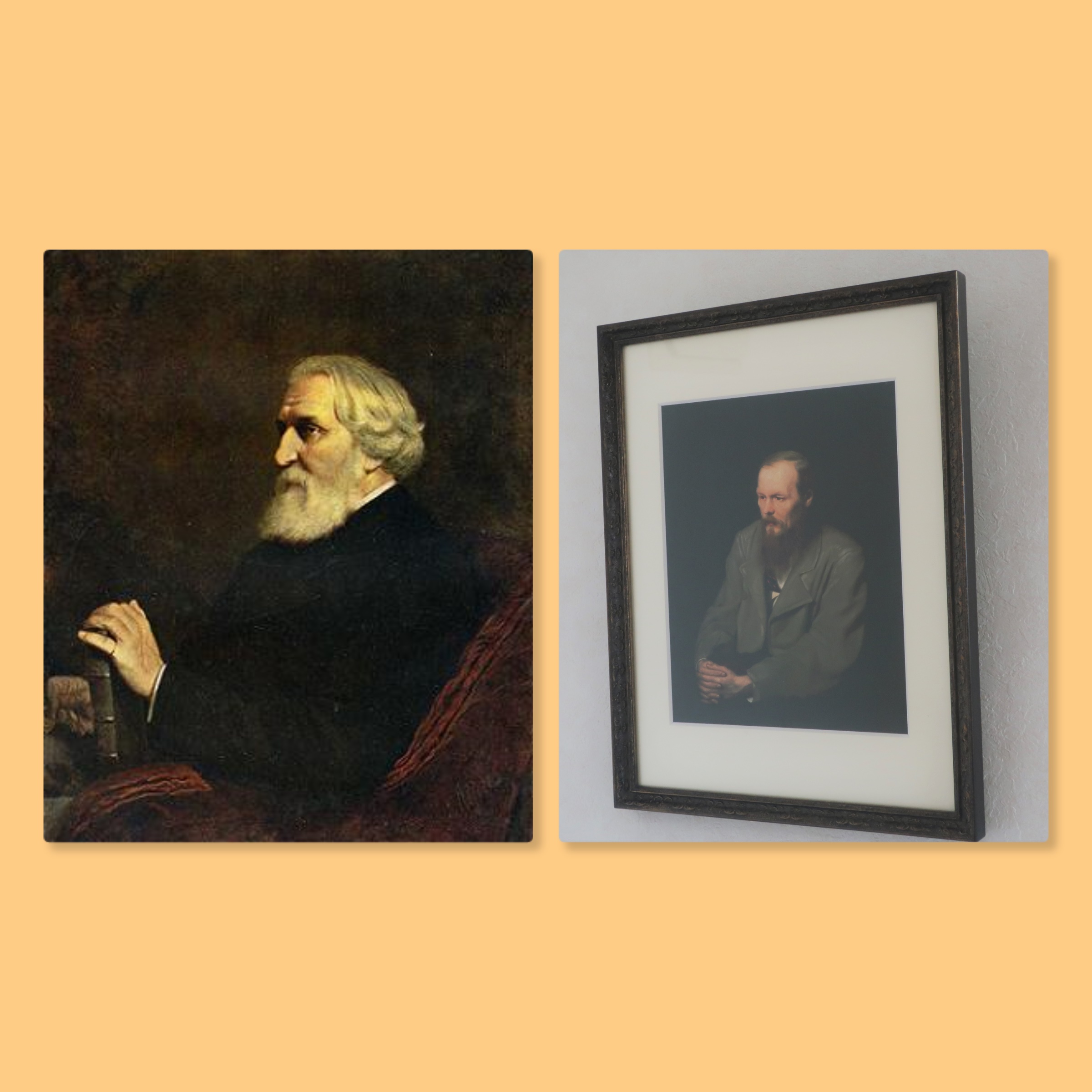
ツルゲーネフとドストエフスキーの出会い―因縁のはじまり
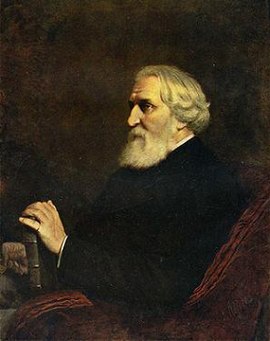
ツルゲーネフ(1818-1883)Wikipediaより
ツルゲーネフとドストエフスキーの不仲は有名な話となっています。
それは文学における思想の違いだけでなく、性格の違いや個人的ないざこざも絡み、二人の最晩年までそのライバル関係は続くことになりました。
今回の記事ではそんな二人が初めて出会ったシーンを紹介していきます。
時は1845年、ドストエフスキーがデビュー作『貧しき人びと』を完成させ、批評家ベリンスキーに激賞されたことで一躍文壇のニュースターとなった頃のお話です。その頃、ツルゲーネフは期待の若手としてすでに文壇で活躍し始めていました。
一八四五年十一月十六日、彼はミハイル(※ドストエフスキーの兄)に書いている。
「いや、にいさん、わたしの名声が今ほど高まったときはないでしょう。いたるところで信じられぬほどの尊敬を受け、わたしへの好奇心はすさまじいくらいです。数えきれぬほどの人びと、それもお歴々に紹介されました。(中略)
だれもがわたしを奇蹟あつかいします。あちらでもこちらでも、ドストエフスキーがこんなことを言った、ドストエフスキーがあんなことをしようとしていると触れまわらないかと、うっかり口もきけません。ベリンスキーはこれ以上考えられぬほどわたしを愛しています……」
美男の貴族ツルゲーネフとの親交は、駆けだしの作家の自尊心をとりわけくすぐった。
「つい先ごろ、詩人のツルゲーネフ(きっと、にいさんもお聞きになったことがあるでしょう)がパリからもどってきて、一ペんでわたしに強い愛着と友情を抱いたので、べリンスキーはそれを、ツルゲーネフはわたしに惚れこんだのだと説明しているほどです。けれどもにいさん、なんというすばらしい人間でしょう!わたしもほとんど彼に惚れこんだくらいです。
詩人で、才能があって、貴族で、美男子で、金持ちで、賢く、教養があって、年は二十五-天が彼に与えなかったものなど想像がつきません。
おまけに、どこまでもまっすぐで、美しい性格、りっぱな修養で作りあげられた性格を持っています……」
ドストエフスキーとツルゲーネフの長年にわたる反目は、たがいが惚れこんだことから始まった。
病的に自尊心の強い作家は、マリインスキー病院のわびしい環境、工兵学校の閉鎖的な世界、貧困と無名の時代からいきなり「上流社会」へ入ったのだ。
ツルゲーネフの貴族ぶりに彼は魅了される。ほかならぬこの貴族ぶりがやがて彼にはやりきれぬものとなる。
モチューリスキー『評伝ドストエフスキー』松下裕・松下恭子訳P53-54
※一部改行しました
驚くべきことに最初の出会いは互いにかなり好印象を持って始まったようです。ドストエフスキーはそれこそ彼に惚れ込んでしまうほどでした。
しかしそんな関係も長くは続きません。
ドストエフスキーはいきなり上流階級に飛び込むことになり、精神のバランスを失っていきます。もともと自意識過剰で、あまりに繊細、あまりに不器用な彼は文壇から徐々に煙たがられます。彼にはイケてる人間集団の中で如才なく立ち振る舞う能力が決定的に欠けていたのです。
そして彼の第二作目の『二重人格(分身)』が発表されるとその作品は文壇から激しく非難されます。デビュー作の『貧しき人びと』で天国を味わったドストエフスキーが今度は地の底に叩きつけられることになります。
ドストエフスキーは絶望的なショックを受け精神障害を患うほどになっていきました。彼はもはや正気を失ったといってもいい状態です。彼の言動はますます高慢で文壇仲間から浮いたものになっていきます。
若い作家の虚栄心と高慢な挑戦的態度は、彼から文学者たちを遠ざけた。容赦のない中傷攻撃が始まり、嘲笑と諷刺詩が浴びせられた。
当時の文学サークルのならわしでは、こういった「追いおとし」はしばしば行なわれた。アヴドーチャ・パナーエワはこう記している。
「若い作家たちがサークルにはいって、非難の対象になったら、それこそ災難である。ところがドストエフスキーはまるでわざとのように、そのいらだちやすい性質と、だれよりもすぐれているといわんばかりに才能をひけらかす尊大な態度とで、そういう機会を招いたのだ。
そこで彼の棚おろしがはじまり、ことあるごとに当てこすっては彼の自尊心をいらだたせた。そういうことにかけてはとりわけツルゲーネフが巧みだった。
わざとドストエフスキーを論争にまきこみ、爆発寸前まで持って行く。ドストエフスキーは前後を忘れて、つい夢中で口走った馬鹿げた意見を躍起になって弁解する。ツルゲーネフはそのあげあしを取って、からかう。
ドストエフスキーは猜疑心のかたまりとなった。あらゆる人から才能をねたまれていると思いこみ、人が何気なしに言った言葉のはしばしに、自分の作品をけなし、自分を侮辱しようとしていると思った。
彼はもう、わたしたちの家に煮えるような憎しみをいだいてやって来ては、やっかみ屋どもにひと言ひと言からみながら、自分を息苦しくさせる癇癪玉を破裂させた。
ところが人びとは、この病気の神経質な男を寛容な態度で見のがさずに、さまざまな嘲笑でますますいらだたせた」。
「病気の男」を痛めつけるようすをグリゴローヴィチが描写している。
「『貧しい人びと』の作者を崇拝せんばかりに持ちあげてから、その文学的才能をたちまち救いようもないほどたたきつけるという変転の意外さは、ドストエフスキーのように感じやすく自尊心のつよい人間でなくとも絶望させるに十分だったろう。やがてべリンスキーのサークルの連中を避けるようになり、まえにもまして自分の殻にとじこもり、極度にいらだちやすくなった。
ツルゲーネフと出会ったさいドストエフスキーは、残念なことに自分を抑えることができず、あなたがたの誰ひとりこわくない、いまに見ていろ、みんなを泥のなかで踏みにじってやるからなどと言って、煮えるような怒りをぶちまけた……。
ツルゲーネフとひと悶着あって以来、ドストエフスキーはベリンスキーのサークルと最後的に袂を分かった。それ以来足も踏みいれなかった。彼にたいして警句やら、えげつない諷刺詩やらが浴びせられ,あきれるほどの自尊心の持ち主だとか、ゴーゴリに嫉妬しているだとか言って非難された」
モチューリスキー『評伝ドストエフスキー』松下裕・松下恭子訳P64-65
※一部改行しました
たしかにドストエフスキーも悪い点があるのですがそれにしても気の毒です。世間慣れしていない不器用な文学青年を寄ってたかっていじめたわけですから。
モチューリスキーはこう言います。
ドストエフスキーと『現代人』グループとの決裂、そうしてツルゲーネフやネクラーソフのような大文学者たちが加わた非難中傷は、ロシア文学界の恥ずべき出来事である。ドストエフスキーの憎悪は、「ロシア史のぺテルブルグ時代」のあらゆる悪の具象化にたいするごとく、ベリンスキーとツルゲーネフに集中した。彼の人生観の発展に、この反目は大く作用したのである。
モチューリスキー『評伝ドストエフスキー』松下裕・松下恭子訳P67
ドストエフスキーを愛する人たちにとってツルゲーネフが悪玉になる原因はこうしたところにあるように思います。
偉大な作家ドストエフスキーをいじめた男ツルゲーネフ。
そんなイメージがたしかに私の中にもあったように思います。
一方、アンリ・トロワイヤの『トゥルゲーネフ伝』ではこの出来事をこうまとめていました。
ドストエフスキーと知り合ったのは、この頃のことである。ドストエフスキーの処女作『貧しき人々』が、べリンスキーに絶賛されていた。トゥルゲーネフはこの人物を好きにはなれなかった。わざとらしく、ぎこちない、おかしな男だと思った。
反対にドストエフスキーの方は、彼に夢中になっている。「トゥルゲーネフは私を愛してくれている」と、兄に書いている。「なんという男だろう。この私まで思わず愛したくなる。才能ある詩人で貴族、美しい青年で金持ちで、しかも知性豊かで教養もある……どうも天はこの男にすべてを与えてしまったようだ。」
その少し後に、トゥルゲーネフは詩人のネクラーソフと一緒になって、意地悪な風刺詩をこしらえた。見栄っ張りで信じやすい、この若い同僚作家にあてつけたものだった。
憂い顔の騎士さん、
ドストエフスキーさん、楽しいホラ吹きさん、
文学の鼻先で、
吹き出物よろしく、赤くなってござる。トゥルゲーネフはすでに、『貧しき人々』の著者が、文芸の仕事における大変なライヴァルとなることを見通していたのだろうか?この躁病患者のような男は、彼の目から見れば、芸術において毛嫌いしているものすべてを体現していた。
すなわち常軌を逸し、冗漫で、泥臭かったのである。
しばらくたってべリンスキーが、ドストエフスキーの二作目の小説『分身』を非難すると、トゥルゲーネフはひどく喜んだ。こうした文学上の小競り合いは、彼の変わらぬ思い、つまりポーリーヌ・ヴィアルドーと再会したいという思いを、ほんのいっとき紛らしてくれるにすぎなかった。
水声社 アンリ・トロワイヤ 市川裕見子訳『トゥルゲーネフ伝』P44-45
※一部改行しました
ドストエフスキーはツルゲーネフに最初惚れこんでいましたが、ツルゲーネフ側からするとどうもそうではなかったようです。
貴族的で優雅で、繊細で、そして極端を嫌い、穏やかな中道を好むツルゲーネフからすればドストエフスキーは奇妙な人間に他なりません。
まして彼の文学は「芸術において毛嫌いしているものすべてを体現していた」のです。それは格好の餌食となってしまうことでしょう。
しかしいじめる側の人間の常として、彼はそれをたいして気に留めることはなかったようです。
いじめられたドストエフスキーは生涯忘れぬ憎悪の元となったでしょうが、ツルゲーネフからすれば気に食わない男をちょっとからかってやったくらいの感覚だったかもしれません。
真相は本人たちにしかわかりませんが、2人の間の亀裂はこうして決定的なものとなったのでありました。
Amazon商品ページはこちら↓
次の記事はこちら

ツルゲーネフのおすすめ作品一覧はこちら
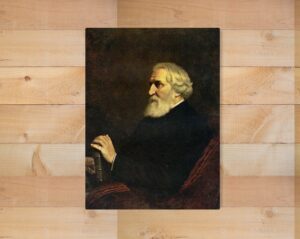
前の記事はこちら
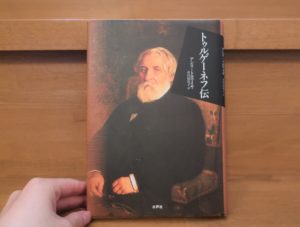
関連記事






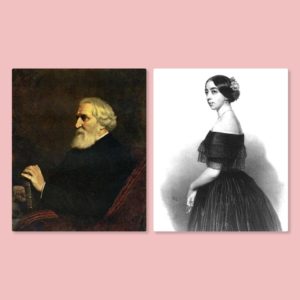



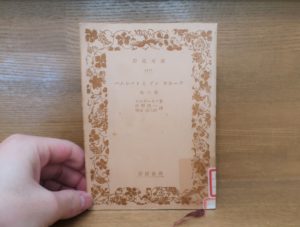
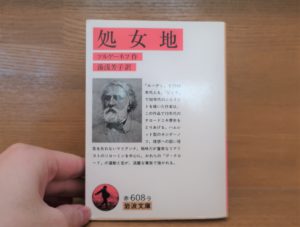
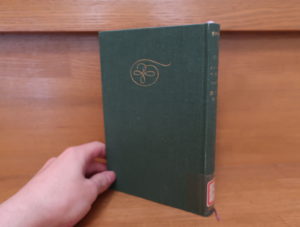


コメント